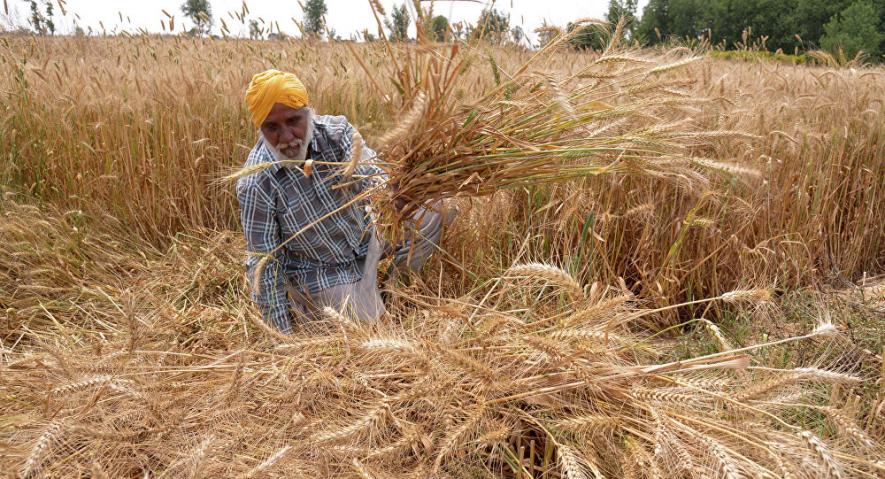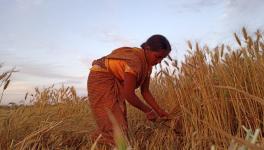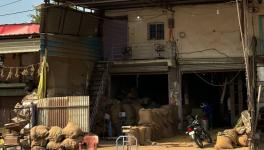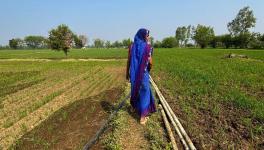Farmers Face Losses as Prices of Produce Coming Crashing Down

Image Courtesy: AFP 2018/Narinder Nanu
Prices of wheat, tur dal, chana dal, masoor dal, jowar, bajra, maize, jeera, turmeric, coriander and mustard have fallen or are expected to fall in the next few days.
Even pricey pomegranates have plunged to their lowest in a decade. And tur dal (pulses)—also known as arhar—has hit prices that are 20% below the support price.
As for potatoes, it is well-known by now how the dirt-cheap prices led the angry farmers to literally dump potatoes on the streets in Lucknow in Uttar Pradesh — which produces about 30% of India’s potatoes.
While the agrarian distress in India has been ongoing for many years now, it has worsened in the past couple of years.
This year, as prices of all manner of agricultural produce are falling due to glut in production, farmers are set for an especially hard time, especially given the mounting input costs.
For the past few years, input costs for farmers have only been rising, but the minimum support price (MSP) offered by the government is not — even though the present Modi government came to power on promises that included giving an MSP of 50% above the input cost, as recommended by the MS Swaminathan Committee.
The demonetisation move in 2016 had especially dealt a terrible blow to farmers, and led to mounting debts.
Last year saw farmer uprisings across the country, demanding remunerative prices for crops and loan waivers, while in November the historic Kisan Mukti Sansad was held in Delhi.
A recent report in the Economic Times (ET) highlighted the falling prices of key commodities in various parts of the country.
Farmers are facing losses in the rabi crop—or the winter crop—which has begun arriving in mandis, the report said. But farmers who had planted pulses are the worst hit.
At the Indore mandi, according to the ET report, the new chana crop reaching the market is being priced 12% lower than the MSP of Rs 4,400 a quintal. Masoor dal was even lower at 15% less than the MSP of Rs 4,250 a quintal.
At the Latur APMC (Agricultural Produce Market Committee) in Maharashtra, tur dal prices are ruling lower than the MSP of Rs 5,450 a quintal by about 20%.
And these prices are expected to slide further with arrivals of chana to pick up, said the report.
The ET quoted Bimal Kothari, vice-president, Indian Pulses and Grains Association (IPGA), as saying: “Only a big procurement operation by the government to the tune of 1-1.5 million tonnes can give support to prices of tur and chana.”
Wheat is not doing much better. In Kota, wheat prices were 7-10% lower than the MSP at Rs 1,650 a quintal, the report said.
Opening stock of wheat in March will be all-time high in the free market to over 3 million tonnes compared with five-year average of 1 million tonnes, as per ET. Food Corporation of India will have 14 million tonnes in March. Prices are likely to remain suppressed as the wheat USDA (United States Department of Agriculture) global stock is at a 10-year high, said the report.
As for mustard, prices are expected to drop sharply in the coming days. At present, the price in the Alwar market was 1% less than the MSP of Rs 4,000 a quintal.
“Immediately, we don't see a fall in prices, but in the next 20 days, mustard prices will correct. In wholesale, mustard oil prices will see Rs 4-5 a litre correction as the new crop gets harvested,” the ET quoted Sanjeev Giri, business head of edible oil at Mother Dairy.
Prices of coriander and turmeric are also falling and expected to decline further, with harvests in progress in Gujarat and Telangana.
Jeera and turmeric have dropped 6% in the past week while coriander has fallen 10% in two weeks, the report said.
Prices of millets like jowar and bajra are also lower than MSP in majority of the markets in Karnataka, Maharashtra and Andhra Pradesh, according to the report.
Prices of kharif maize, currently arriving in markets, is lower than the MSP by 15-20%, while the prices of rabi maize, to be harvested after two months, is likely to remain low due to carryforward stocks. Vegetable prices, like every winter, have crashed too.
While onions are faring relatively better, the report said prices are likely to fall in April given the quantity of onions farmers have planted.
Agriculture minister Radha Mohan Singh told ET that a “serious issue” now was to focus on “buying produce from farmers at MSP rate,” adding that the food ministry was working with states to ensure higher procurement.
Get the latest reports & analysis with people's perspective on Protests, movements & deep analytical videos, discussions of the current affairs in your Telegram app. Subscribe to NewsClick's Telegram channel & get Real-Time updates on stories, as they get published on our website.
























